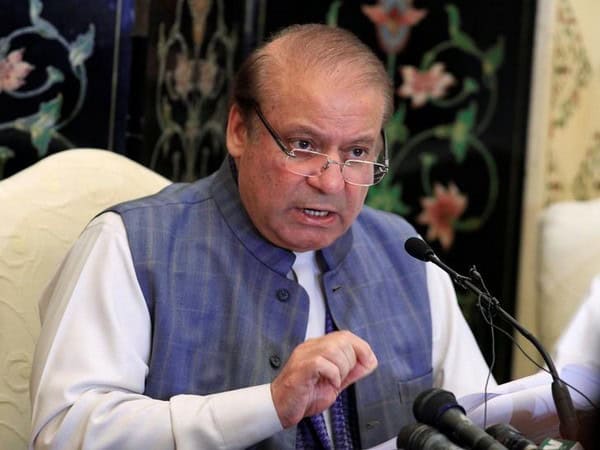Islamabad: Pakistan’s former Prime Minister Nawaz Sharif, sentenced to seven years in prison in a corruption case, has returned to jail after being out on bail for six weeks owing to illness.
The Pakistan Muslim League (Nawaz) leader left his Jati Umra residence in Lahore for the Kot Lakhpat jail in a procession of hundreds of PML-N workers led by his daughter Maryam Nawaz around 8.30 p.m. on Tuesday, Dawn online reported.
He was scheduled to reach the jail by sunset, but eventually arrived past midnight after obtaining a special permit to enter the prison later than expected.
Sharif’s convoy was surrounded by people chanting slogans and throwing flower petals onto the car in which he and his daughter were travelling.
“Nawaz Sharif came along with a rally to the jail and he reached the jail premises at around 12.20 a.m,” an official at the Kot Lakhpat prison, Ahsan Ullah, told Efe news.
“The jail authorities had gone to his residence in the evening to take him under custody but they refused,” Ullah said.
Sharif later thanked his supporters for accompanying him to jail at midnight, saying: “I do not have words to thank you for the passionate way in which you welcomed me.”
He said that their prayers would release him from the “dark prison cell”, in a video shared by his daughter on Twitter.
The Supreme Court on March 26 granted Sharif six weeks bail for medical reasons after he was sentenced in December 2018 to seven years in prison in the Al Azizia Steel Mills corruption reference. He was jailed for failing to explain the ownership of the steel factory in the name of one of his children.
The case was filed in the wake of the apex court’s July 28, 2017 order in the Panama Papers case.
In July 2018, Sharif was sentenced to 10 years in prison in another case of corruption related to a four-storey luxury property in London while his daughter was given seven years.
The three-time Premier was disqualified from holding office in 2017 for not revealing remuneration he received from a company owned by a son, an irregularity revealed after the publication of the Panama Papers.
[source_without_link]IANS[/source_without_link]

